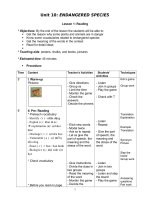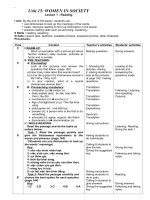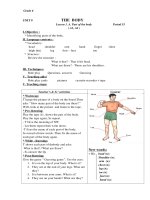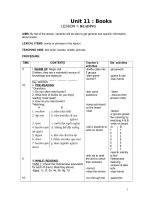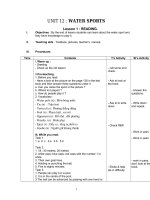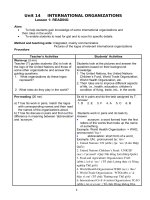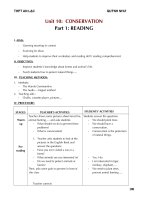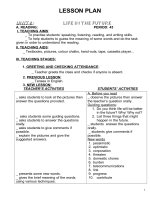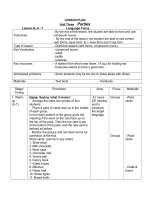Lesson plan11ADVANCE - unit 3
Bạn đang xem bản rút gọn của tài liệu. Xem và tải ngay bản đầy đủ của tài liệu tại đây (101.19 KB, 5 trang )
LESSON PLAN
Unit Three Parties
Lesson N
o
6 - 7 Language Focus
Outcomes
- By the end of the lesson, the student are able to form and use
compound nouns.
- By the end of the lesson, the student are able to use correct
verb forms: base form, to + base form and V-ing form
Type of lesson - Grammar-based (verb forms, compound nouns)
Key Vocabulary - compound nouns
- resist
- justify
- rehearse
Key structures - A station from which train leave. / A cup for holding tea
- Everyone seems to have a good time.
Anticipated problems - Some students may be too shy to share ideas with others.
Materials - Text book - Handouts
Stage/
Timing
Procedure Aims Focus Materials
1. Warm-
up
(5-7’)
Game: Saying ‘what it means’
- Arrange the class into groups of four
students
- Place a pack of cards face up in the middle
of each group.
In turn each student in the group gives the
meaning if the word on the card face up on
the top of the pack. Then the top card is put
at the bottom if the pack, and the new card is
defined as before.
- Monitor the groups and not down errors for
correction at the end.
Word cards: (can be in any order)
1. Shoe shop
2. Milk chocolate
3. Book case
4. chocolate milk
5. Tennis ball
6. history book
7. Guest house
8. Milkman
9. Paper bad
10. Street lights
11. Bread knife
-To rouse
SS’ interest,
and to
introduce
the target
language
Groups
Groups
- Word
cards
- Word
cards
- Chalk &
board
2. Word
study
( 8 – 10’)
12. road accident
13. income tax
14. vegetable garden
15. toothpaste
Expected answers:
1. Shop that sells shoe
2. Chocolate made with milk
3. Piece of furniture for books
4. Milk flavored with chocolate
5. Ball used to play tennis
6. book about history
7. house for guests
8. (especially in Britian) someone tho delivers
milk to customers each morning
9. bag made of paper
10. Lights in the street
11. Knife used for cutting bread
12. Accident that happens on the road
13. Tax that you pay on your income
14. Garden where vegetables are grown
15. Paste for cleaning teeth
- Refer to these correct combinations, and tell
SS that these are compound nouns.
Transition: In today’s lesson, we’ll get to learn
more about compound nouns and other
grammar points.
Unit 3 Parties - Language Focus
Compound Nouns
- Elicit the form from SS.
FORM
- Draw SS’ attention to the following points:
• The first noun is normally singular but
the meaning is often plural.
A bookshop is a shop where you can
buy books.
An apple tree is a tree that has/
produce apples.
• the two nouns are often written as
separate words, but we sometimes use
a hyphen(-), or we write them as a
single word.
A tea break at the tea-table
a large teapot
• There are often rules about whether
- For SS to
play and
learn
- To make a
transition
into the
lesson
- To help
SS under-
stand how
compound
nouns are
formed
- To help
raise SS’
awareness
of the
spelling of
C. nouns
- To enable
SS to under
-Groups
T-class
T-class
T-class
Pairs
- Chalk &
board
- Chalk &
board
- Chalk &
board
- Textbook
N + N = Compound noun
(6 – 7’)
(8 – 10’)
(8-10’)
we join the two words or not. If you are
unsure, it is usually safest to write two
separate words.
USE: to mean one thing/ person / idea
• The first noun is like an adjective-it
tells us what kind of thing/ person/
idea, etc. For example:
A tennis ball = a ball used to play
tennis
A taxi driver = tax that you pay on
your income
• Sometimes the first noun tells us which
thing etc. is meant.
garage roof = The roof of the
garage
sea temperature = the temperature of
the sea
Activity 1: Writing compound nouns (Task
a, p.42)
- Have SS do task a, textbook, p.42.
- Call on SS to speak out the answers.
- Invite class opinions and give feedback.
Activity 2: Math-up (task b, p.42)
- Have SS match up a noun in column A with
one in column B to form a compound noun.
(textbook , p.42)
- Call on SS to write the answers on the
board.
- Go over the answer with the whole class
Activity 3: Sentence completion
- Ask SS to complete each of the sentences
below with an appropriate combination of two
words from the box. (handouts)
weather list milk books seat
shopping forecast man history belt
1. ‘Have you watched the ______on TV
today?’ ‘Yes, it says there will be a heavy
storm at about ten tonight, doesn’t it?’
2. The man was fined for exceeding the
speed limit. Moreover, he wasn’t wearing the
_____.
3. A ______ is a list that you make of all
things you needs to buy when you go
shopping.
4. My father is very interested in history. He
reads two ______ a month.
–stand the
meaning of
C.Nouns
- To give SS
a chance to
practice
forming
compound
nouns
- To help
SS
recognize
and form
compound
nouns
- For SS to
practice
using
forming and
using
C.nouns in
contexts
- to help
review
common
verb forms
T-class
Indivi-
duals
Indivi-
duals
Indivi-
duals
T - class
T - class
- Textbook
- Textbook
- Textbook,
- Handouts
- A copy of
verbs for T.
3. Verb
forms
(12-15’)
5. We run out of milk. Has the _____ arrived
yet?
- Call on SS to speak out the answers.
- Elicit class opinions and give feedback.
Expected answers:
1. weather forecast 2. seatbelt 3. shopping
list 4. history book 5. milk man
Review of verb forms: base/ to-base/ V-ing
- Organise the class into teams of three
- Read out one of the verbs below
Manage, resist, let, seem, avoid, need, want,
remind, tell, decide, premise, enjoy, mind,
stand, encourage, force, invite, practice,
finish, make, get, delay, postpone, agree,
afford, admit, consider, threaten, fail, arrange
- Each team has ten second to sound out ‘to
infinitive’ , ‘base’ ‘V-ing’.
- Go to each group in turn and award a point
for a correct response. On each new round,
the teacher starts with a different team.
- Do not give the correct forms when incorrect
response but simply shout ‘No’. If the group
fails to give the correct response, the turn
passes to the next group.
- Keep a running total of points for each
group on the board.
_ After the game has finish, the teacher
writes these categories on the board :
Base form to- base form V-ing
- Assign SS to write up some corresponding
verbs that they can remember from the
previous game.
- Go over the answer with the whole class.
Expected answer:
Base form
Let, make, have, modal verbs + V(base form)
To-base form
*verb +O+ to- base form
Tell, remind, force, enable, teach, order,
warn, invite, persuade, expect, ask, want,
beg, would like, would love, would have,
would prefer, …
Verb + to-base form
Manage, offer, decide, hope, deserve,
attempt, agree, plan, aim, threaten, refuse,
arrange, learn, forget, fail, seem, appear,
for SS
- For SS to
learn and
respond
- To
categorize
verbs for
SS to learn
- To make it
clear for SS
to learn
T - SS
T – class
T – class
- A copy of
verbs for T.
Chalk &
board
Chalk &
board
(8-10’)
(10-12’)
(6-8’)
4.Home
work
tend, pretend, claim, …
V-ing form
Delay, avoid, consider, miss, finish, involve,
practice, postpone/ delay, imagine, admit
deny, stop, suggest, *recommend, *advise,
*allow/permit, *encourage
Activity 1: Choosing the correct verb form
(task b, .43)
- Have SS do task b (textbook, p. 43)
- Call on SS to speak out the answers and
write them up on the board.
_ Elicit class opinions and give feedback
Activity 2: Choosing the correct verb form
(Task c, p.44)
- Put SS into pairs and have SS do task c
( textbook, p. 44)
- Call on SS to speak out the answers.
- Elicit class opinions and give feedback.
Activity 3: Transformations
- Ask SS to complete the second sentences
so that they mean the same as the first ones.
0. I can do what I want and you can’t stop me.
You can’t stop ……..me doing what I
want ………….
1. They didn’t allow me to park here.
They didn’t let ………………………………
2. It’s not a good idea to travel during the rush
hour.
It’s better a avoid …………………………..
3. I can’t force you to do this if you don’t want
to.
I can’t make …………………………………
4. My father said I could use his car.
My father allow ………………………………
5. Tell me tomorrow that I have to pay them.
Will you remind
……………………………......... ?
- Call on SS to write the answer on the board
and check.
Expected answers:
1. me park here
2. traveling during the rush hour
3. you do this if you don’t want to
4. me to use his car
5. me to pay them tomorrow
- For SS to
practice
using
correct verb
forms in
contexts
- To focus
on to –base
from or ing-
form of
verbs
- To help
SS to not
only
understand
the
meaning of
verbs but
also use
correct verb
form to
express the
same ideas
- To
introduce
SS to
language
Indivi-
duals
Pairs
Indivi-
duals
Indivi-
duals
Textbook
Textbook
Handouts
Food
labels
